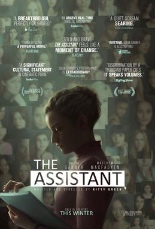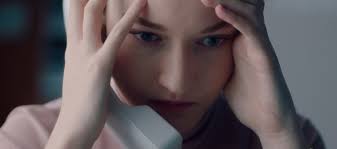
 Fresh from a well-deserved Emmy win for the Netflix crime series Ozark, Julia Garner faces arguably more dangerous territory in — and as — The Assistant, set entirely within one workday. As the lowest rung of a Miramax-esque film company in New York City, her Mary stays busy making copies, fielding phone calls, washing dishes, balancing checks and fetching water — glass-bottled, of course. Across the movie’s 87 minutes, we watch her perform so many menial tasks, you may feel like you deserve three hours’ internship credit.
Fresh from a well-deserved Emmy win for the Netflix crime series Ozark, Julia Garner faces arguably more dangerous territory in — and as — The Assistant, set entirely within one workday. As the lowest rung of a Miramax-esque film company in New York City, her Mary stays busy making copies, fielding phone calls, washing dishes, balancing checks and fetching water — glass-bottled, of course. Across the movie’s 87 minutes, we watch her perform so many menial tasks, you may feel like you deserve three hours’ internship credit.
Most of The Assistant is as dull as Mary’s day, until signs of her boss – who’s heard but never seen — become more common. He’s the film’s ersatz Harvey Weinstein, a blustery, berating bully apparently more interested in chasing tail rather than talent. As Mary navigates this toxic environment, culminating in a futile meeting with an HR representative (Matthew Macfadyen, 2010’s Robin Hood), her soul slowly deflates like a balloon days after the party, air seeping from Garner’s perpetually sour pucker. Yet nothing really happens, in terms of story.
 Unconventional documentarian Kitty Green makes her narrative debut with The Assistant, yet the pulse of her previous project, Casting JonBenet, cannot be located. Her film may have nailed the #MeToo timing, but is itself something of a quiet slog. In keeping the audience from hearing (except in select occasions) the other end of the movie’s many phone conversations, which constitute a good chunk of dialogue, Green keeps the viewer from engaging with her material. It’s an odd directorial choice — one I respect, although don’t necessarily like.
Unconventional documentarian Kitty Green makes her narrative debut with The Assistant, yet the pulse of her previous project, Casting JonBenet, cannot be located. Her film may have nailed the #MeToo timing, but is itself something of a quiet slog. In keeping the audience from hearing (except in select occasions) the other end of the movie’s many phone conversations, which constitute a good chunk of dialogue, Green keeps the viewer from engaging with her material. It’s an odd directorial choice — one I respect, although don’t necessarily like.
Make no mistake: The Assistant is not the finely tuned workplace thriller it’s expertly sold to be. Its themes of sexual harassment will attract the curious, only to yield wildly mixed results: cathartic for a few, a horror show to a few more, and baffling to most everyone else. —Rod Lott
